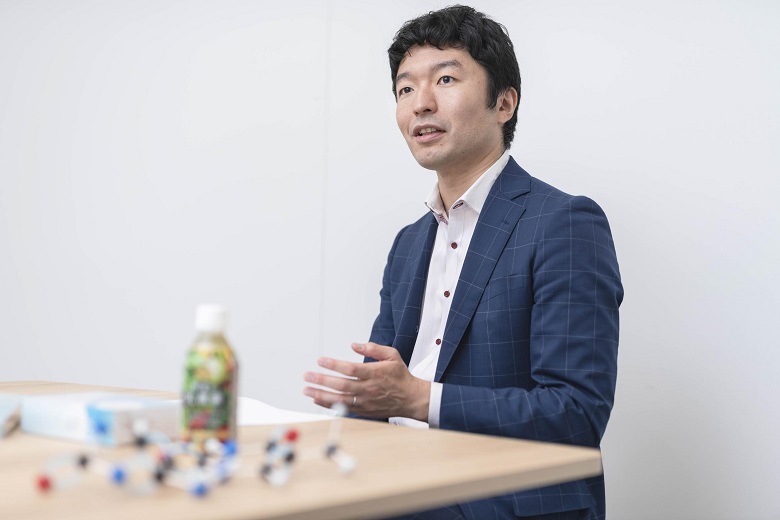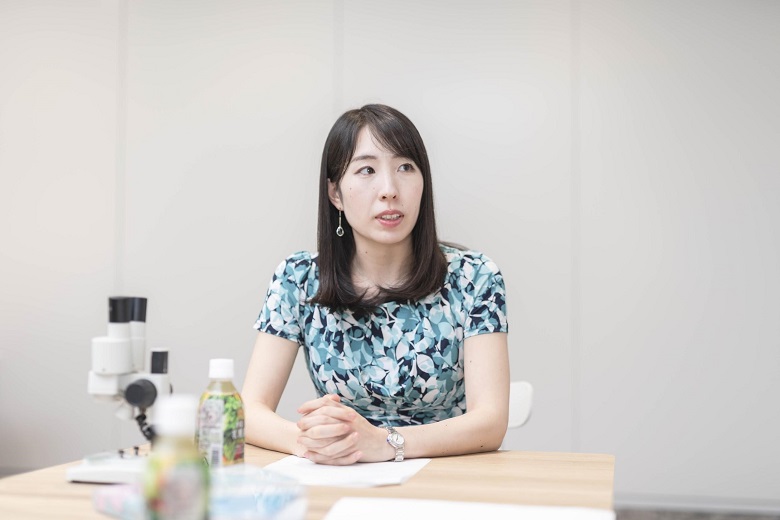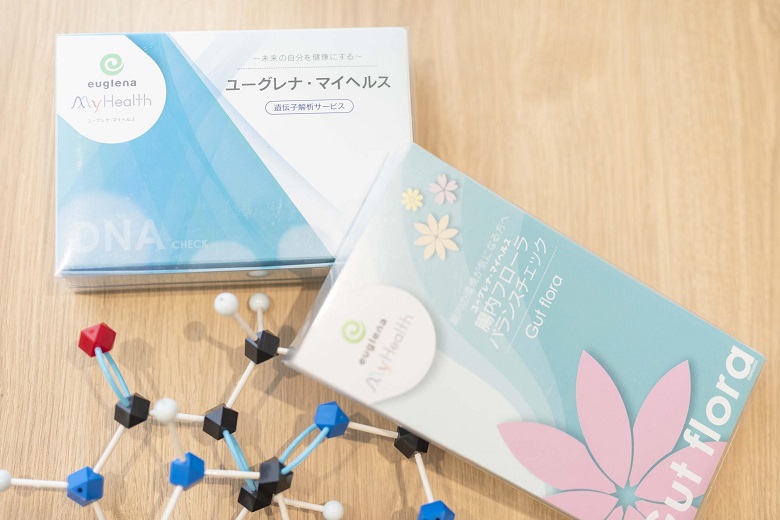"I said on TV that the food was good for my diet ...".
Do you ever choose food with that feeling? However, by nature, "things that are good for your health" are different for each person.
What is good for your body? How can I get to know more about my body?
In order to solve such a question, Mr. Yu Sawai, the representative of Saikinso Co., Ltd., which is promoting the commercialization of intestinal flora analysis, and Shoko Takahashi, the representative of GeneQuest Co., Ltd., the Executive Officer of Euglena Co., Ltd. We asked about what the analysis can tell us and how to use it.
What kind of health care do intestinal flora and genetic analysis professionals have?
Indispensable for "intestinal activity"! What is "intestinal flora"?
-In recent years, "intestinal activity" that regulates the intestinal environment has been attracting attention mainly from women. Among them, I often hear the word "intestinal flora", but what is "intestinal flora" in the first place?
Representative Sawai (hereinafter Sawai): Hundreds of species, 600 to 1,000 trillion bacteria, live in our human intestines, and we feed on what humans eat, compete with each other, and live while helping each other. I'm making it.
Since the bacteria spread in the intestines like a flower field, the word "flora" is used to describe the flower field, and it has come to be called "intestinal flora".

Yu Sawai (CEO of Saikinso Co., Ltd.)
Graduated from the Department of Applied Chemistry, Faculty of Engineering, University of Tokyo. Involved in advanced medical venture project for 5 years at eSolutions. After that, he gained experience in corporate planning at a venture company engaged in the development of bioplants for useful chemicals using microbial genome analysis technology. Knowing the world of the human indigenous bacterial flora (microbiome), he established Saikinso in 2014.
— 1,000 trillion bacteria in the intestines! ??
Shoko Takahashi (hereinafter Takahashi): Bifidobacterium, lactic acid bacteria, butyrate-producing bacteria, equol bacteria. These are also intestinal bacteria, aren't they?
Sawai:Oh yeah. There are various types of "intestinal bacteria" in a bite.
Is "diversity" necessary for the intestinal environment?
— By the way, what kind of condition is desirable for the intestinal flora? Is it better to have many kinds of bacteria, or is a specific bacterium indispensable?
Sawai: Basically, it is thought that higher diversity is better.
Bacteria in the intestines have various functions such as breaking down foods that the human body cannot digest, adjusting the immune system to protect the body from harmful bacteria, and controlling infectious diseases.
This kind of work cannot be done by humans alone. In other words, humans have the intestinal bacteria that live in their bodies take on functions that they do not have. That's why it's better to have diversity.
Takahashi: Humans live by acquiring various functions from various intestinal bacteria. The diversity of bacteria makes it possible to respond to changes in the environment. Is the intestinal environment affected by the changing dietary habits due to the recent changes in human dietary habits due to globalization and changes in distribution?

Shoko Takahashi (Euglena Co., Ltd. Executive Officer in charge of Bioinformatics Business / GeneQuest Co., Ltd. Representative Director)
Graduated from the Faculty of Agriculture, Kyoto University. In June 2013, he started GeneQuest Co., Ltd. while enrolled in the doctoral program at the Graduate School of Agriculture and Life Sciences, the University of Tokyo. Completed the doctoral course in March 2015 and obtained a doctorate. We provide a genome analysis service that conveys genetic information on disease risk and constitution to individuals. April 2018 Appointed Executive Officer in charge of Bioinformatics Business, Euglena Co., Ltd.
Sawai: Yes, intestinal bacteria change depending on eating habits, so the intestinal environment is changing with the changes in eating habits. In addition, the intestinal environment is involved in various diseases. For example, it is said that the appearance of intestinal bacteria in the intestinal flora is greatly involved in food allergies.
Basically, eating a wide variety of foods is less likely to cause a hypersensitive reaction to certain foods, but an unbalanced diet can reduce the diversity of the gut flora. ..
Knowing your intestines will change your choice at convenience stores
-I see in magazines that it is important to prepare the intestinal flora, but how do you know the condition of your intestinal flora?
Sawai: You can check the current condition by using a kit that analyzes the intestinal flora. In the analysis of intestinal flora, what kind of bacteria are present and how many are measured. Based on that data, I can look back on my behavioral rhythm and lifestyle.
Takahashi: I have had three "intestinal flora balance checks" in the last few years.
Sawai: 3 times! (Lol)

Sawai: How was it when you received it?
Takahashi: The first result was constipation, and after that you started to pay attention to your health.
In the past, I was busy and often used lunch boxes at convenience stores, but now I cook for myself and eat a lot of vegetables in a well-balanced manner. Think about the balance of protein and sugar, and calculate the calorie intake.
Then, in the results of the second and third times, the ratio of each intestinal flora changed!
Sawai: As expected. It's been about half a year since I changed my diet.
Actually, I'm getting worse (laughs). Bacteria, which are said to be important for boosting the body's immunity, are gradually decreasing, and he said, "This is bad."
Therefore, I am trying to change the products I choose at convenience stores. You can make rice balls made from millet rice or brown rice bran. I don't cook for myself like Mr. Takahashi, but I started to pay attention to food.
Takahashi: Even with rice at convenience stores, your choice will change. Has anything changed as a result?
Sawai: I'll try to check it again next time (laughs) I'm a good example, but visualizing your health condition with such a test kit will give you an opportunity to review your diet and lifestyle. must.
Takahashi: Nowadays, I often make subjective judgments that my stomach isn't feeling well or I'm not feeling well these days, but if I have scientific data, I can objectively know the indicators about my health. I think it will be easier to understand and take measures.
Sawai:I agree. By objectively knowing your physical condition from data, the way you receive and interact with information will change.
If you are a healthy person, I would like you to use it with the feeling of having a medical examination once every six months to a year.

Research and development that progresses speedily. The new future is approaching
— Will such self-checking health management become commonplace in the future?
Sawai:That's what I think. I think there are two possibilities for analyzing the intestinal flora. One is early detection of the disease. The other is to grasp the "constitution" of each individual with the intestinal flora.
For example, whether this food is suitable or not, and which one should be eaten to prevent future illnesses. I think it will be used more widely as a predictor of health risks for me.
Takahashi: Currently, the idea of curing after getting sick is still common, but by spreading the analysis of genes and intestinal flora, we can predict the future of our body and change the future by prevention. I think that it will change to the idea of ".
In addition, I think that technology will help us to detect illnesses early and improve our daily performance by visualizing conditions such as "I'm not sure, but I'm feeling sick".
Sawai: Moreover, this area is evolving at a fairly high speed. For example, in January 2019, a paper that dementia and intestinal bacteria are strongly related was published and became a hot topic. As a position in the industry, I feel that research is progressing in a wide variety of ways.
Takahashi: The number of treatises has been increasing at an accelerating rate in the last few years. The increase in the number of treatises means that new discoveries are being made one after another. Considering the current trend, I think that various things will be clarified every few years from now on.
Sawai: If they are implemented in society, the future of humankind will surely change significantly.
Takahashi: Let's do our best together to realize a society where everyone can know their bodies better!

* Honorific titles omitted in the text
Composition: Konomu Mizumoto / Photo: Yuji Tanno / Editing: Yu Oshima

